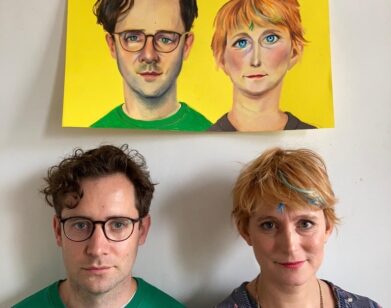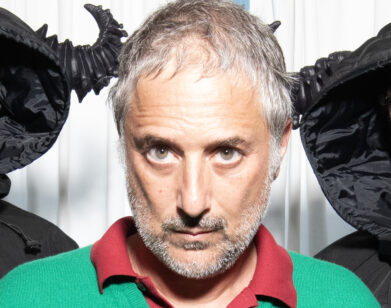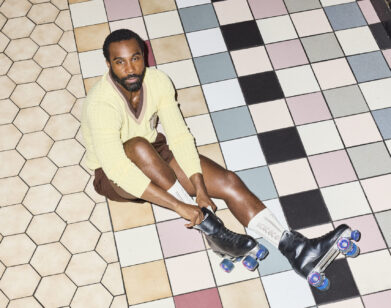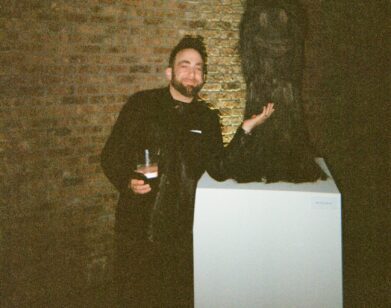Charlie McDowell Finds The One
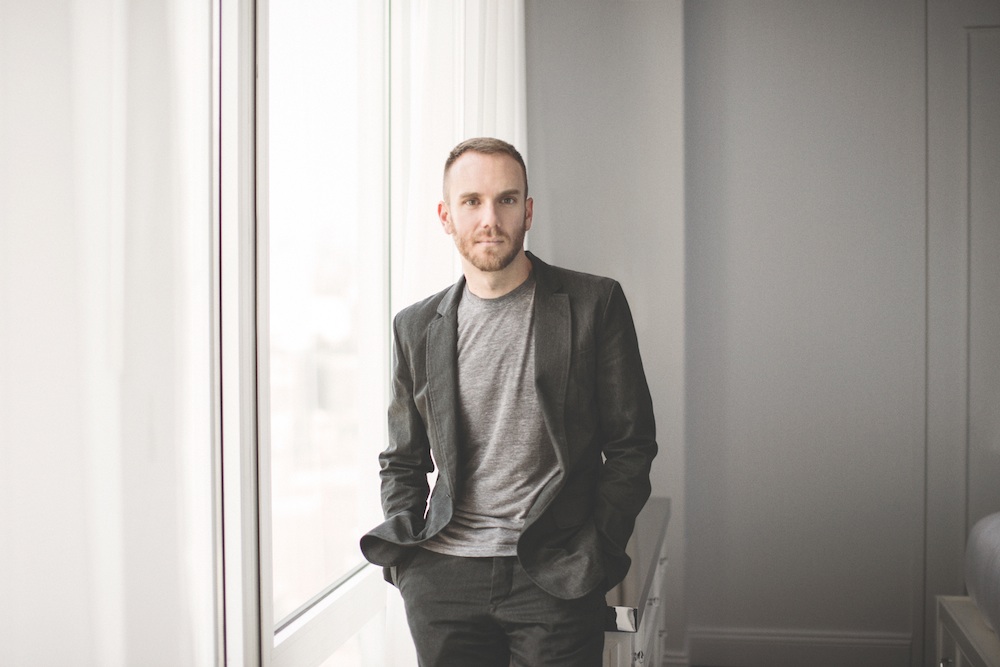
ABOVE: CHARLIE MCDOWELL IN NEW YORK, AUGUST 2014. PHOTO BY CHRISTOPHER GABELLO.
Ethan (Mark Duplass) and Sophie (Elisabeth Moss) are having marital troubles. At the suggestion of their couples’ counselor, they rent a house in the country for the weekend. It is magnificent: white and wooden with an immaculately tended garden, swimming pool, and guesthouse.
To say anything more on the plot of The One I Love, Charlie McDowell’s directorial debut, would be to say too much. The film, which premiered at Sundance and played at Tribeca, is a tight two-hander: a big idea in a limited setting that you will keep coming back to long after the film is finished. “The kernel of the idea started with relationships, and how all of us tend to give the best version of who we are when we start a relationship,” explains McDowell. “All of a sudden you’re more into museums or you like cats—these little things that we play up and [until] we almost become a character of ourselves.”
McDowell, who turned 31 last month, was raised in the film industry: his father is the British actor Malcolm McDowell (Alex from A Clockwork Orange), and his mother is American actress Mary Steenburgen. Danson, who briefly appears as Ethan and Sophie’s eccentric therapist, is McDowell’s stepfather.
EMMA BROWN: When did you start working on The One I Love?
CHARLIE MCDOWELL: It was a bizarre experience. Justin [Lader], the writer, [and I] had been working on this other film, or we had this script that we were trying to make for, like, four years. [We] went through the ups and downs of independent filmmaking—having financing and it falling through. I met Mark Duplass and he’s like, “Let’s just go make a movie!” And I was like, “What do you mean? How do you do that?” “We contain it and we control it ourselves. It’s a few locations, a few actors.” So we wrote for a specific location and reverse engineered the script so that we could actually go make the movie and not wait around on other people. From that idea to writing the movie, casting, and actually making the movie was like five months. It was insane. It was so quick, and I didn’t quite think it was real because I was used to these long periods of time where you’re waiting on people to read something. It was a very nice experience to be able to do that.
BROWN: How did you meet Mark Duplass?
MCDOWELL: I signed with the same agent as him, and she was like, “You have to meet Mark, you guys have a similar kind of energy and vibe and I think you guys would get along.” She got us in a room together and we just clicked. He liked what I was focusing on and what I wanted to make. Then I got the call one day where he’s like, “All right, let’s go do it now.”
BROWN: When did Elisabeth come in?
MCDOWELL: Mark suggested Lizzie because she had reached out to him saying “I want to make something with you.” It was all text messaging. I had just seen a screener before it came out of Top of the Lake, which you see and you’re like, “Are you kidding? Yes, I would love her to be in my movie.” She felt really right for this part. They felt like a real couple to me; they didn’t feel like two actors that came to L.A. to be famous or to be actors.
BROWN: I know you want to divulge as little of the plot as possible, but there’s something unusual going on in the film. I felt that Sophie and Ethan worked out the basic aspects of it very quickly, but then they were much slower to figure out other things—like who else knew about it.
MCDOWELL: Yeah, there’s a lot of intricate plotting and logical things that come up in the movie. For us, it was really about making sure that we had rules and that we didn’t break these rules—whether those rules are in the movie or not, which most of them aren’t. We felt like we had to stay true to, “This is the back story of everything, this is who these people are. We’re going to give you just enough information to move it forward, but ultimately we want you to connect to these people and that’s what you should focus on.”
BROWN: What was the first rule you established?
MCDOWELL: I don’t know if there was the first rule, but it was mostly about what the guesthouse represented. For me, the guesthouse was one character and the main house was one character and two very different things happened in those spaces. My nerdy answer is I used spherical lenses in the main house and then anamorphic lenses in the guesthouse. I used different colors. They really became two separate characters, and that was something I established early on and something I made sure that I wanted to follow.
BROWN: You used a score instead of a lyrical, song-based soundtrack. Did you ever consider using songs? Did you have placeholder songs when you were making the film?
MCDOWELL: Well, we couldn’t afford them, so that was taken [out] right off the bat. I put some temp music in in the beginning that was lyrical stuff and some of it worked and then some of it didn’t. The score ultimately was what defined the tone of the movie, and it’s much easier to do that with a score than lyrical pieces, just because you’re focusing on lyrics and what they’re saying and all of that. This was an atmospheric, bizarre score, which Danny [Bensi] and Saunder [Jurriaans] are just unbelievable with. I saw this movie, Martha Marcy May Marlene, that I really loved that they had done and I felt like they had really helped define what that tone was. This is obviously lighter than that movie but I really liked the approach of hitting more dramatic sounds.
BROWN: When you had a first cut of the The One I Love, who was the first person you approached: “Please watch this and give me your honest opinion”?
MCDOWELL: Mark was the first person because he was also a producer, but then I really reached out to the people who I knew who were filmmakers who terrified me. The fact that I sent it to them… now I’m like, “What the hell was I thinking?” But I just really wanted their opinion. Steven Soderbergh was one, the writer Scott Frank was another, and then Lena Dunham was another one. They were all people that I really respected their opinion and I knew I would get good notes. I sent them a rough cut on a Vimeo link with temp music and it wasn’t even locked. It was great because that was the moment when I realized that we really had a movie. They had some notes and they wanted to discuss things, but they were like, “This is good. You have something.” You’re sitting in a room with your editor and you’re going through footage all the time and then you put it together and there’s a point where it’s like, “I have no idea if this is good or not. I’ve seen it way too many times.”
BROWN: What was the most helpful feedback you got?
MCDOWELL: It was such specific things, but Steven Soderbergh gave a really interesting note where he said, “You’re going to end up screening this for a lot of people and everyone’s going to have their opinion. Don’t fuck it up now. Yes, there are things you can work on. Tweak things, clarify things, do all those things, but don’t start making these big changes because you’re going to fuck it up.” There was a moment where we tested it, and it didn’t work, certain things. I was like “Do I have to do a big change?” And then, “No, Steven said I don’t, so I don’t need to.”
BROWN: Now that The One I Love is coming out, are you going to return to the script you were working on before it?
MCDOWELL: No, we’re working on something else. That project, we really wanted to make it, [but] now that we’ve made The One I Love, for some reason it feels like a step back. Maybe we just got burned too many times on it that I can’t go back to it right now. But Justin and I just finished a new script, which is building on what we did with The One I Love and taking a high concept idea and focusing on the dramedy, character-driven aspect to it. We really like people like Spike Jonze, Charlie Kaufman—those are definitely influences—that tell universal stories in a completely different and unique way.
BROWN: How did you first start working with Josh?
MCDOWELL: We both went to AFI. I was there for directing and he was there for screenwriting. We went at different years, but I had read the script that we ended up working on for years. I had read a first draft that my friend sent me because they were in a class together. It was such a smart, unique voice, so I just called him up.
BROWN: Are you a permanent team now?
MCDOWELL: We’ll definitely do stuff without each other, but for us, it’s great because Justin’s really, really, really strong with plotting and devices and all of these intricate details of what the plot does and I care much more about character and performance. We bring those two together.
BROWN: Do you remember your first formative film experience?
MCDOWELL: My parents are in the business—they’re actors—so I kind of grew up on a film set, which was a funny place to grow up. My mom was in this film called Parenthood (1989) with Steve Martin and a bunch of people. I was a little kid—I think I was six or something—and I was an extra in the party scene where Steve Martin is dressed up like the cowboy. I was sitting there in the blazing-hot sun, and I remember thinking, “This is the worst job in the entire world. Why would anyone want to do it?” I remember watching Ron Howard, who directed the film, and being like, “Wait, who’s that guy? He doesn’t have to sit here in the sun. He’s telling people what to do. He’s controlling this whole thing.” I remember being this little kid and being like, “I want to be that guy.” I think that was my first memory of wanting to be behind the camera.
BROWN: Did you understand what you were doing? I think I would have gotten bored and wandered off set as a six-year-old.
MCDOWELL: I knew what a movie was because I had grown up with it. I was excited, because [my scene] it was a bunch of kids, [but] after an hour, I was like, “I’m done. I want to leave.” And they were like, “No, you’re in the movie now, you have to be here for the entire day.” So then I had to sit there while I was just a little dot in the background in a wide shot, and that, I hated. There was a moment where I was like, “Do I want to be an actor?” And that quickly went away when I remembered that moment.
BROWN: Like Richard Linklater’s daughter who wanted her character to die after filming Boyhood for a few years.
MCDOWELL: Oh, really? That’s awesome, and I totally understand it. [laughs]
THE ONE I LOVE OPENS TOMORROW, AUGUST 22, IN LIMITED RELEASE.

